New Year’s Eve this weekend has ushered in the most eventful of political seasons in America: a presidential election year.
While much of the world will be transfixed by the drama surrounding the likely rematch between former President Donald Trump and incumbent Joe Biden, the road to November is paved with similarly consequential, and gripping, contests across the globe. Some will elect new leaders, others are on track to reward incumbents. Those in parliamentary systems must choose which party to empower, and which to weaponize against each other.
Below, five pivotal elections to watch in 2024.
Taiwan – January 13
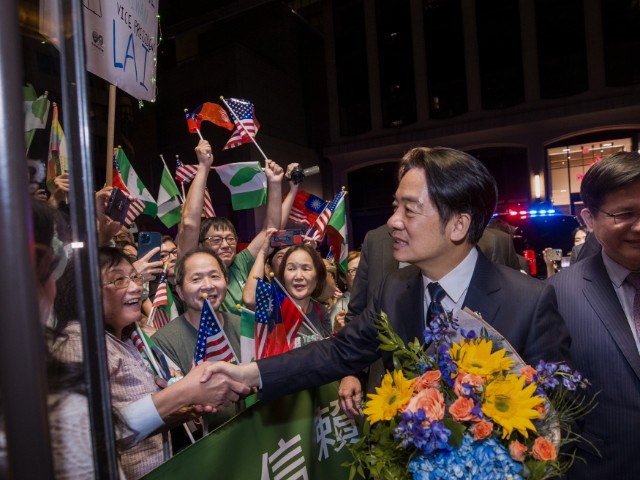
In this photo released by the Taiwan Presidential Office, Taiwan’s Vice President William Lai, second right, shakes hands with his supporters upon arrival in New York on Sunday, Aug. 13, 2023. (Taiwan Presidential Office via AP)
Aside from the United States, Taiwan is arguably holding the single most important presidential election in the world this year. Incumbent President Tsai Ing-wen is term-limited out of running, so voters must choose among three new options: Lai Ching-te (William Lai), the candidate representing Tsai’s stridently anti-communist Taiwan People’s Party (TPP); Hou Yu-ih of the China-friendly Kuomintang; and Ko Wen-je of the minor Taiwan People’s Party (TPP), a surprise third-party run eating into Kuomintang support.
Lai has consistently been polling ahead of his contenders, though polls as of December 17 show Lai with a much narrower three-point lead against Hou, the candidate consistently landing in second place. Hou’s and Ko’s votes combined could easily defeat Lai – and they know it. The two parties attempted to form a unity ticket in November, but egos prevailed, as neither candidate agreed to take the vice-presidential slot, so they may yet seal each other’s losses. Another wrench in the race – the short-lived presidential run of Foxconn mogul Terry Gou – also fizzled out. Gou’s company does extensive business in China, so his run was seen as potentially China-friendly, thereby taking votes from Hou and Ko, not from Lai.
The determining factor in the race will be how much Taiwanese voters take China’s threats of invasion seriously, and whether they truly believe the Kuomintang’s conciliatory approach is the safest bet.
El Salvador – February 4
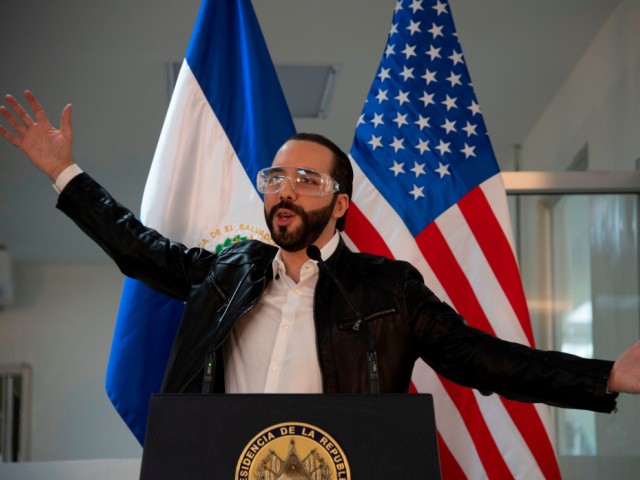
El Salvador’s president Nayib Bukele, accompanied by US Ambassador to El Salvador Ronald Johnson (out of frame), speaks during a joint press conference at Rosales Hospital in San Salvador on May 26, 2020. (YURI CORTEZ/AFP via Getty Images)
Voters in El Salvador are facing an unprecedented election in 2024. Their president for most of the last five years, Nayib Bukele, is running for reelection – which is explicitly unconstitutional. Yet polls show him enjoying an over 60 percent lead over his closest contender, and the nation’s Supreme Court issued a ruling stating that he can run so long as he resigns shortly before the election. Bukele stepped down on December 1 to fulfill the ruling’s provisions.
Bukele, of the third-party “New Ideas” coalition, is wildly popular due to his law enforcement policies. The president declared war on the country’s extremely violent drug and human trafficking gangs, placing the country in a “state of exception” that greatly expanded the government’s ability to conduct mass arrests, stage mass trials, and otherwise rapidly process suspected criminals. Bukele has openly touted the construction of “megaprisons” to house tens of thousands of men suspected of drug activity. As a result, local reports indicate, gangs have largely disappeared from public life, allowing civilians to engage in normal activities such as using public parks, establishing small businesses, and going to school without the fear of being attacked or extorted by a gang member. Complaints from international human rights advocates that Bukele is eschewing due process and amassing tremendous political power have done little to hurt his popularity in the country.
Bukele is facing modest opposition from Manuel Flores, the candidate of the establishment leftist Farabundo Martí National Liberation Party (FMLN), and Joel Sánchez of the Alianza Republicana Nacionalista (ARENA), the two major parties in El Salvador before Bukele’s rise (Bukele is a former FMLN member but was expelled for “defaming” colleagues). Polling and experts do not expect either to pose much of a challenge. The uncertainty in this race will be the aftermath of a presumed Bukele win: how much more political capital will that give a leader accused of being authoritarian, and how will he use it? And how will El Salvador’s allied nations, including America, welcome him back into the fold?
Tunisia – September/October 2024
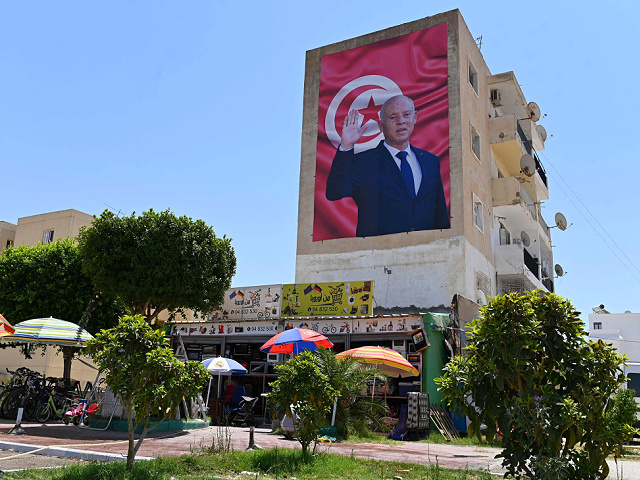
A billboard depicting Tunisia’s Kais Saied hangs on the side of a building in the east-central city of Kairouan, on July 26, 2022. (KABIL BOUSENA/AFP via Getty Images)
Tunisia, the birthplace of the “Arab Spring” and a pivotal crossing point for many African migrants seeking entry into Europe, is expected to hold its first presidential election in 2024 following the abrupt dissolution of the government in 2021 and the adoption of a new constitution a year later.
Tunisia has been turbulent politically since Mohamed Bouazizi, a street vendor, set himself on fire to protest police allegedly demanding bribes in 2010, an event largely considered the trigger for the series of government topplings known as the Arab Spring. The country returned to presidential elections after the overthrow of Zine al-Abidine Ben Ali in 2011, a direct result of Bouazizi’s protest.
Unlike other “Arab Spring” nations, Tunisia appeared to return to democracy with the election of 88-year-old veteran politician Beji Caid Essebsi in 2014. Current President Kais Saied succeeded him in what was largely considered a free and fair election in 2019 following Essebsi’s death.
Saied was described at the time as a “conservative professor” and an “outsider” winning a landslide against opponents who were considered establishment options. He reportedly obtained around 90 percent of the 18-to-25-year-old vote in that election.
Saied is believed to be running for reelection this year with a much different reputation than he had when he first won the presidency. The president’s 2021 crackdown – stripping lawmakers of legal immunity, paralyzing Congress, and triggering mass resignations among his officials – fueled distrust of Saied in the country. High inflation, unemployment, and general political disillusion have since decimated his support among young voters and fueled protests of thousands of people. Voters turned out in dramatically low numbers for parliamentary elections this year, signaling a lack of enthusiasm. Adding to concerns that Saied would not allow a truly free election, he announced the banning of international election observers in the upcoming election.
Whether Saied can hold on to power will depend not only on how free and fair the election is, but who actually runs against him. At press time, there is no formal candidate list for the 2024 race, which does not still have a fixed date. At least one politician, however – businesswoman Olfa Hamdi of the Third Republic Party – has formally announced her intention to run against Saied. Hamdi is promising a softer stance on migrants transiting through the country on their way to Europe and campaigning against Saied’s negotiations to limit migration to Europe.
Other potential candidates, including the leader of the Islamist opposition, Rached Ghannouchi, are currently in prison.
Portugal – March 20
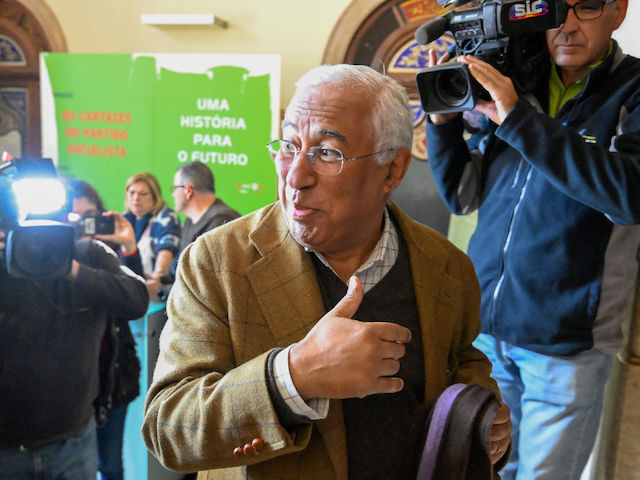
Portuguese Prime Minister and outgoing Secretary-General of the Socialist Party Antonio Costa smiles as he arrives surrounded by journalists in the Portuguese Socialist Party HQ to meet with his successor Pedro Nuno Santos on December 17, 2023, in Lisbon, Portugal. (Horacio Villalobos#Corbis/Corbis via Getty Images)
Portuguese voters will go to the polls in March to determine the makeup of their national legislature in a snap election triggered by the resignation of Prime Minister António Costa, a socialist caught up in a police corruption probe that abruptly ended his career. The Socialist Party currently has a majority in the parliament but is plagued by corruption allegations beyond Costa: multiple socialist government ministers, Costa’s chief of staff, and the head of Portugal’s environmental agency were among the implicated.
The chaos in the Socialist Party has created a window of opportunity for the right-wing populist party Chega, which advocates for a more robust law-and-order agenda, less government bureaucracy, and the eradication of corruption. Polling in December indicated that the establishment center-right party, the Social Democratic Party (PSD), was likely to garner the most votes nationwide, surpassing the socialists. But the same polls showed Chega – a relatively new, populist outsider party – attracting 13 percent of the vote, making it likely the third-largest party in Parliament. Such an outcome would give the party significant leverage to move the PSD further right and limit Socialist Party influence in legislation. It would also give Chega influence in supporting a prime minister if it joins a coalition government.
The head of the PSD, Luis Montenegro, “told the press he would never form a government with Chega but it remains to be seen if that is enough to convince moderate voters,” Politico observed in November.
Pakistan (again) – February 8
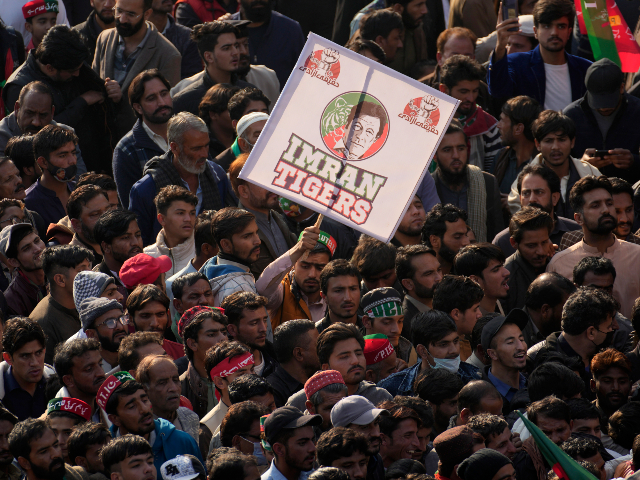
Supporters of Pakistan’s former Prime Minister Imran Khan’s ‘Pakistan Tehreek-e-Insaf’ party attend a rally, in Rawalpindi, Pakistan, Saturday, Nov. 26, 2022. (AP Photo/Anjum Naveed)
Pakistan’s politics are so dysfunctional that it actually appeared in the 2023 iteration of Breitbart News’ elections-to-watch list but never actually held the elections leaders promised that year. After stalling on calling elections for as long as possible, the country’s Supreme Court ordered the prime minister to hold elections, refreshing the makeup of the Parliament and paving the way for a new prime minister.
The currently ongoing political crisis in Pakistan began with the ouster of widely popular radical Islamist Prime Minister Imran Khan in April 2022 with a parliamentary vote of no confidence. Khan is arguably Pakistan’s most popular politician and rose to power on a platform condemning establishment predecessor Nawaz Sharif and his inner circle for alleged corruption. Khan also emboldened violent Islamist extremists, who continue to enthusiastically support Khan despite his ouster and subsequent arrests. Shehbaz Sharif, Nawaz’s brother, succeeded Khan as interim prime minister, fueling more popular outrage against Pakistan’s political elite.
Khan is currently in prison after multiple attempts to detain him resulted in mob scenes in front of his home, forcing police to retreat. He has been nonetheless galvanizing his base and campaigning from prison by writing speeches and having an AI likeness of himself deliver them. Khan is attempting to appear on the ballot for February’s election representing his Pakistan Tehreek-e-Insaf (PTI) – alongside the leaders of the two other major parties in the country, Pakistan People’s Party (PPP) leader Bilawal Bhutto-Zardari and Pakistan Muslim League – Nawaz (PMLN) leader Maryam Nawaz Sharif. Nawaz Sharif, Maryam’s father, is also reportedly filing to run for office and openly seeking the prime ministership.
Polling and popular opinion are often less important in Pakistani elections than in other countries due to low voter turnout and political turbulence that does not guarantee all politicians campaigning will be on the ballot by Election Day. The applications to run for Parliament seats so suggest the election will happen this year, though the outcome is difficult to predict. Khan will likely not appear on the ballot, as he remains in prison, but his supporters are very likely to riot in response, potentially forcing the government’s hand. The PMLN enjoys unenthusiastic support from voters seeking stability, and the PPP – a left-leaning party promising expanded social programs – could always surprise. And the ultimate wildcard – the Pakistani military – has the potential to disrupt any voting trend it deems a threat to its power.
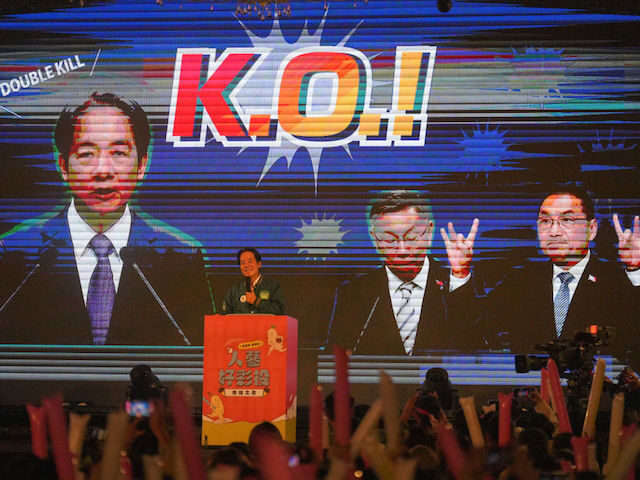
COMMENTS
Please let us know if you're having issues with commenting.